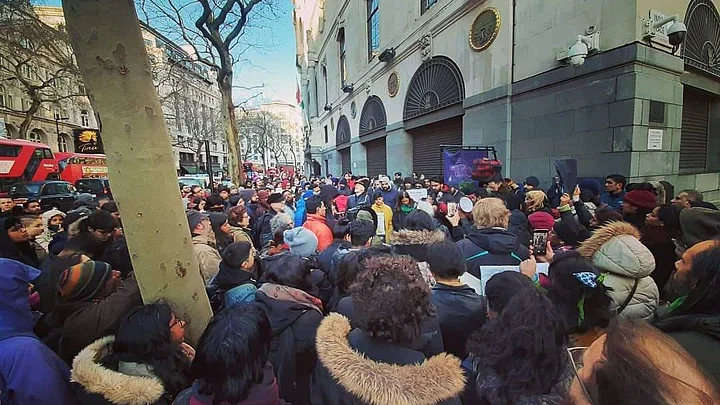The BJP government’s ambitions under Prime Minister Modi and Home Minister Amit Shah, to alter the country's social fabric, has not only divided the country but also lifted the veil, showcasing a dangerous communal agenda of transforming a secular India into a ‘Hindu rashtra’.
Late to the party, the international community is now starting to recognise the grave and impending outcomes of this government’s policies which are seen as enabling a gradual and systematic disenfranchisement of the world’s second largest Muslim population.
The Citizenship Amendment Act (CAA) as a constitutional blunder, in conjunction with conflicting statements and official records on the implementation of National Register of Citizens (NRC) and National Population Register (NPR), have nearly broken the camel’s back and impacted the citizens’ faith in Modi’s governance, despite the decisive mandate his party received in the recent Lok Sabha elections.
We are, therefore, deeply concerned, to see this transition from a decisive to a divisive India.
CAA & Political Propaganda
Our concerns are two-fold:
One, on the religiously discriminatory CAA and the misinformation created around it to mislead the global community, and second, the communal riots that erupted in Northeast Delhi.
First, it has been claimed that the CAA gives amnesty to members of all major six religions entering into India from Afghanistan, Pakistan and Bangladesh.
While we appreciate the act of commission, that is, to whom the law is choosing to give fast-track citizenship, it would be a failure to ignore its act of omission, that is, to whom it is willfully excluding (Muslims, Jews and Atheists) — also the primary source of protests.
Second, while justifying CAA, Modi harked back to the Nehru-Liaquat Act of 1950 stating: “Why did he [Nehru] not use then all citizens instead of minorities there… Did he discriminate between Hindus and Muslims? Did he want a Hindu Rashtra?” Contrarily, the Nehru-Liaquat Act, or Delhi Act of 1950, ensured that the two governments agreed that “minorities throughout its territory will have complete equality of citizenship, irrespective of religion.” Misappropriating the historical facts today for political propaganda is as callous and sinister as the self-proclaimed ‘success’ of demonetisation that killed nearly 100 people, plummeted India’s economy to nearly 3 percent, and did not meet any of its objectives according to the Reserve Bank of India’s (RBI) annual report.
Issues With CAA
Third, while CAA makes no mention of ‘religiously persecuted’ people, understandably it includes exemptions of certain groups under Passport (Entry into India) Act or the Foreigners Act. Notably though, both these aforementioned Acts have also been challenged in the Supreme Court in 2015 for the same discriminatory reasons and are still pending before the apex court. By extension and in simpler words, the CAA is an illegal construction on an alleged illegal foundation – such a building cannot stand tall for long.
Fourth, CAA is not only designed on arbitrary grounds but also violates fundamental rights as per India’s constitutional guarantees – the right to equality (Article 14), right to life and liberty (Article 21), right to religious freedom (Art. 25) and critically compromises India’s secular credentials as per the Amendment 42.
What CAA Compromises On
Fifth, while as a sovereign republic India has full authority to make legislations that suit her landscape, the CAA compromises her commitment to uphold the Universal Declaration of Human Rights, the International Covenant of Civic and Political Rights (ICCPR), and the Convention for the Elimination of Racial Discrimination (ICERD), of which India is a signatory. Evidently, stated international declarations prohibit discrimination on the basis of racial, ethnic or religious grounds (here, here).
Sixth, the CAA against the ill-planned National Register of Citizens (NRC) in Assam has already impacted Indian citizens such as a Kargil war veteran; women and children; a former Chief Minister of Assam, Syeda Anwara Taimu, including the family of India’s fifth President Fakhruddin Ali Ahmed. It also puts in jeopardy nearly 700,000 Muslims in Assam to be sent to detention camps, where nearly 28 deaths have already been reported.
Saffronisation of Delhi
Amidst the peaceful sit-ins and protests by thousands of Indians including women and student population in response to CAA, a BJP leader’s ultimatum to Delhi Police threatening to use any means to clear the roads in Jaffrabad and Chand Bagh once President Donald Trump leaves India, was not an empty threat. Subsequently, the city witnessed communal violence resulting in over 45 civilian fatalities, with over 250 people severely injured and infrastructure loss.
The visuals of youth vandalising, burning mosques and placing a saffron flag while sloganeering a religious war cry mirrored the Babri Masjid demolition.
Modi’s decisive mandate in the 2019 elections was an opportunity to turn India around but his party’s tunnel vision of India as a Hindu nation stands in the way.
In bringing in Acts that have shaken India’s foundation, compromising key institutions’ independence, and saffron supremacy that has brought India to the brink of an ethnic conflict with devastating consequences, the truth remains that women and citizens protesting to safeguard India’s democracy, wounded students and broken bodies protecting India’s secular values and social fabric are not the real enemy today.
(Manish Madan, Ph.D., is an Associate Professor of Criminal Justice at Stockton University in New Jersey. He has written, among others, for HuffPost, NewsLaundry, National Herald, and published his research in international journals.
Debolina Maitra, Ph.D. in Literacy Education, is a Postdoctoral Researcher on Social Justice and Racial equity. She has contributed to the International Literacy Association blog and published research articles on equity based culturally relevant pedagogy in different journals.
This is a personal blog and the views expressed are the authors’ own. The Quint neither endorses nor is responsible for them.)
(At The Quint, we question everything. Play an active role in shaping our journalism by becoming a member today.)



